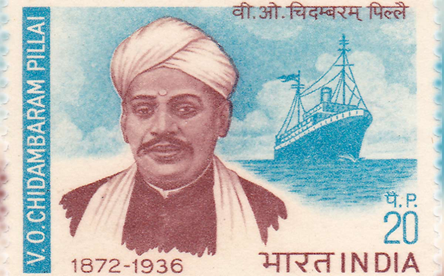

7th September 2022 (6 Topics)
Context
- Thousands of people gathered at the Coimbatore Central Prison to pay homage to freedom fighter V. O. Chidambaram on his 151st birth anniversary.
About
Who was V. O. Chidambaram?
- Vallinayagam Olaganathan Chidambaram Pillai (VOC) was popularly known as Kappalottiya Tamilan (The Tamil Helmsman).
- C Chidambaram Pillai was born on 5th September 1872 to an eminent lawyer Olaganathan Pillai and Paramyee Ammai in Ottapidaram, Tirunelveli district of Tamil Nadu.
- He graduated from Caldwell College, Tuticorin. Before beginning his law studies, he worked for a brief period as the taluk office clerk.
- He died on 18th November 1936 in the Indian National Congress Office at Tuticorin as was his last wish.

Why V. O. Chidambaram is called as Kappalottiya?
- Inspired by the Swadeshi movement, he mobilized the support of local merchants, and launched the first indigenous Indian shipping enterprise, the Swadeshi Steam Navigation Company, thus earning for himself the name Kappalottiya.
Entry in Politics:
- He entered politics in 1905 following the partition of Bengal.
- By the end of 1905, he visited Madras and was drawn closer to the Swadeshi Movement initiated by Bal Gangadhar Tilak and Lala Lajpat Rai.
- He was drawn towards Ramakrishna Mission and came into contact with Subramania Bharati and the Mandayam family.
- It was not until the arrival of VOC at Tuticorin (Present day Thoothukudi) that the Swadeshi movement in Tirunelveli district began to gather force and momentum.
Role Played in Freedom Movement:
- By 1906, he won the support of merchants and industrialists in Tuticorin and Tirunelveli for the idea of establishing a Swadeshi merchant shipping outfit by the name of the Swadeshi Steam Navigation Company.
- He established many institutions like Swadeshi Prachar Sabha, Dharmasanga Nesavu Salai, National Godown, Madras Agro-Industrial Society Ltd, and Desabimana Sangam.
- Even before Gandhiji’s Champaran Satyagraha (1917), he took up the cause of the working class in Tamil Nadu, and thus he is a forerunner to Gandhiji in this respect.
- He along with other leaders resolved to take out a mammoth procession on the morning of 9th March 1908 to celebrate the release of Bipin Chandra Pal from jail and to hoist the flag of Swaraj.
Some of his important Literary work can be summarized as follows:
- Meyyaram (1914), Meyyarivu (1915), Anthology (1915), Thirukural with literary notes of Manakudavar (1917), Tholkappiam with literary notes of Ilampooranar (1928), Autobiography (1946).

